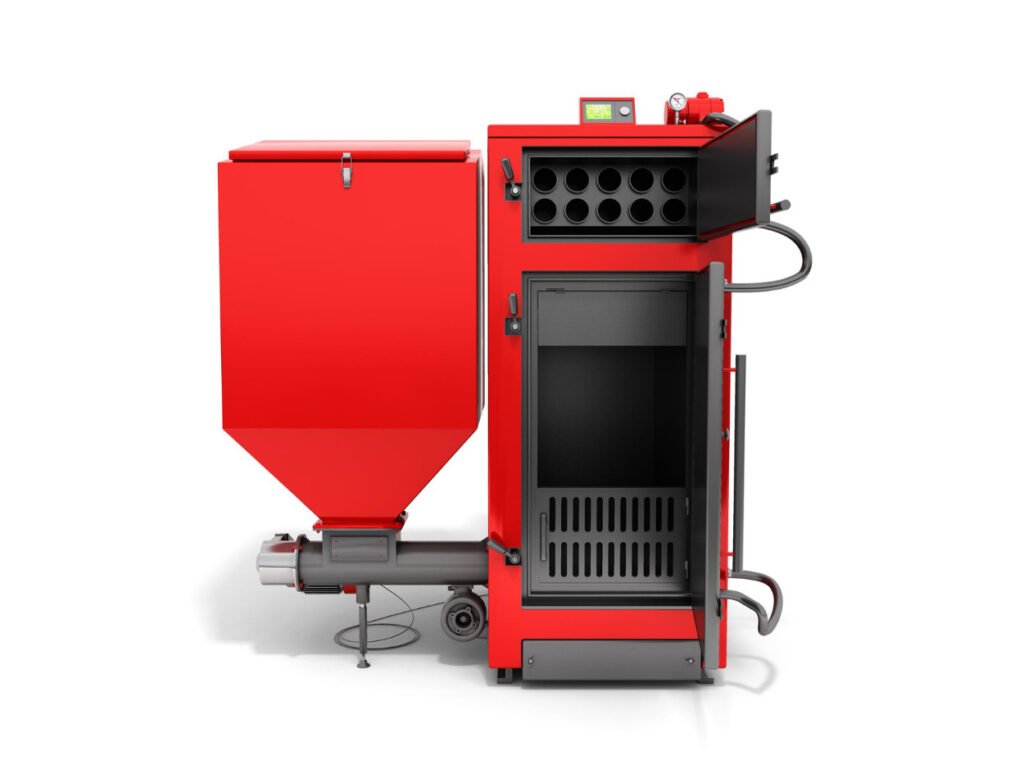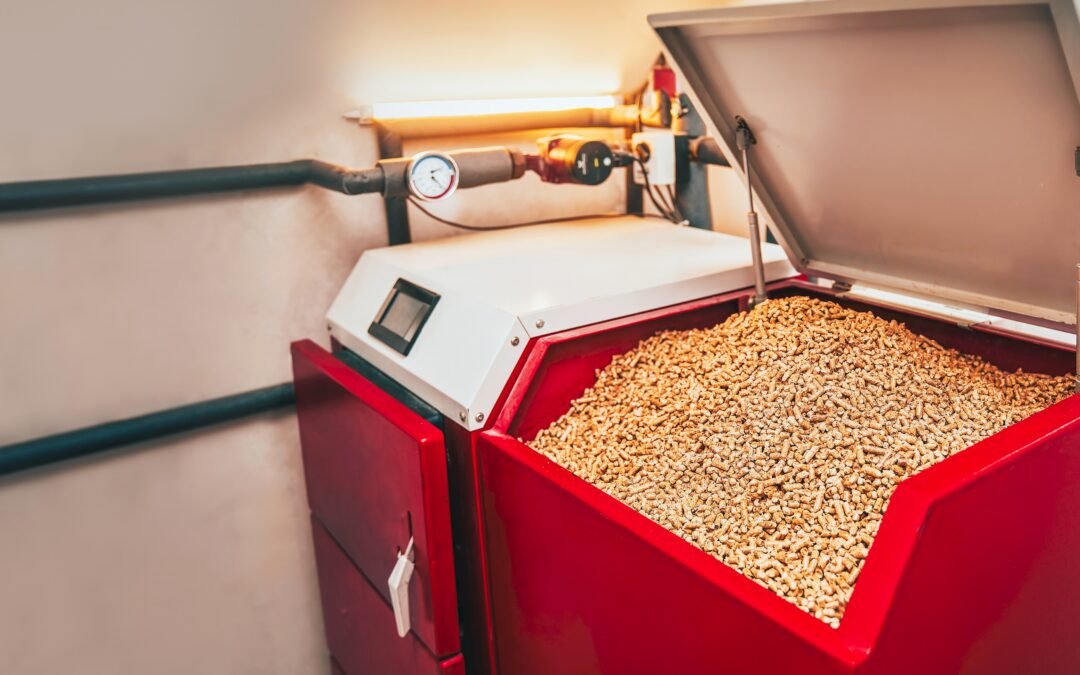Biomass boilers are an environmentally friendly alternative to traditional fossil fuel heating systems. These boilers use organic materials—such as wood chips, pellets, or logs—to produce heat and hot water for residential and commercial properties. By harnessing renewable resources, biomass boilers help reduce carbon emissions and dependence on non-renewable fuels.
How To Keep Biomass Boiler Running Efficiently
The functionality of biomass boilers revolves around the combustion of biomass fuel in a controlled environment. The heat generated from burning the fuel is transferred to a heat exchanger, which then warms up the water in your heating system. The efficiency of this process is significantly influenced by the type and moisture content of the biomass used, which makes selecting the right fuel crucial.
Importance of Monitoring Your Biomass Boiler
Effective monitoring of your biomass boiler is vital to ensure its optimal performance and longevity. Regular observation helps identify any potential issues before they escalate into costly repairs, thereby maintaining the system’s efficiency and safety. By understanding the operational patterns of your boiler, you can make informed decisions about maintenance and fuel choices.
Monitoring involves keeping track of various parameters, such as temperature, pressure, and combustion efficiency. Digital controls and smart monitoring systems can provide real-time data, enabling you to adjust settings promptly to optimise performance. This proactive approach not only enhances the boiler’s efficiency but also reduces energy consumption.
Furthermore, consistent monitoring helps in understanding the fuel consumption patterns of your biomass boiler. By analysing this data, you can optimise fuel usage, leading to reduced operational costs. This practice not only benefits your pocket but also aligns with sustainable energy goals by minimising waste and emissions.
Key Indicators for Monitoring Boiler Performance
To ensure your biomass boiler operates at peak efficiency, it’s important to monitor several key performance indicators. These indicators provide insight into the boiler’s health and can alert you to any necessary adjustments or repairs.
- Combustion Efficiency: This measures how effectively the boiler converts fuel into heat. High combustion efficiency indicates optimal fuel usage, reducing waste and lowering costs.
- Flue Gas Temperature: Monitoring the temperature of gases leaving the boiler can indicate heat exchange efficiency. High flue gas temperatures may suggest heat loss, necessitating adjustments to improve performance.
- Pressure Levels: Consistent pressure within the system is crucial for safe and effective operation. Fluctuations may point to leaks or blockages that need addressing.
By routinely checking these indicators, you can maintain your boiler’s efficiency and prevent unexpected failures. Utilising digital monitoring tools can simplify this process, providing alerts and detailed reports for informed decision-making.
Choosing the Right Fuel for Your Biomass Boiler
Selecting the appropriate fuel is essential for maximising the efficiency and lifespan of your biomass boiler. The choice of fuel impacts combustion performance, emissions, and maintenance requirements. Therefore, understanding the characteristics of different biomass fuels can guide you in making the best selection for your needs.
The primary factors to consider when choosing biomass fuel are moisture content, calorific value, and particle size. Wood pellets, for example, offer a high calorific value and low moisture content, making them a popular choice for many biomass systems. However, the cost and availability of pellets can vary, so it’s essential to consider local resources.
It’s also crucial to consider the compatibility of the fuel with your specific boiler model. Some boilers are designed to handle a range of fuels, while others may require specific types. Consulting your boiler’s manufacturer or an expert can provide guidance on suitable fuel options, ensuring optimal performance and longevity.
Different Types of Biomass Fuels and Their Suitability
Biomass fuels come in various forms, each with distinct properties and applications. Understanding these differences is key to selecting the right fuel for your biomass boiler. Below is a table outlining common biomass fuels and their suitability:
| Fuel Type | Moisture Content | Calorific Value (MJ/kg) | Suitability |
| Wood Pellets | Low (6-10%) | High (16-18) | Ideal for automated systems, low ash |
| Wood Chips | Moderate (20-30%) | Moderate (12-15) | Suitable for larger systems, cost-effective |
| Logs | High (up to 50%) | Low (8-12) | Best for manual systems, requires drying |
| Agricultural Residues | Varies | Varies | Cost-effective, may require processing |
| Energy Crops | Moderate | Moderate to High | Sustainable, specific for energy production |
Wood pellets are often preferred for their efficiency and ease of use, especially in automated systems. Wood chips are more economical but require larger storage space and may need a more robust boiler system. Logs, while traditional, require significant manual handling and are best suited for smaller or rural applications.
Choosing the right biomass fuel involves balancing cost, availability, and compatibility with your boiler. By considering these factors, you can optimise your heating system for both performance and sustainability.
The Role of Proper Servicing in Boiler Efficiency
Regular servicing of your biomass boiler is crucial to maintaining its efficiency and extending its lifespan. Professional servicing ensures that all components are functioning correctly and that any potential issues are addressed promptly. This proactive maintenance approach can prevent unexpected breakdowns and costly repairs.
During a service, technicians will typically inspect the boiler’s combustion chamber, heat exchanger, and flue system. They will also check for signs of wear and tear, clean essential components, and adjust settings to optimise performance. By keeping your boiler in top condition, you can ensure it operates safely and efficiently.
Proper servicing is not only about fixing existing problems but also about preventing future ones. Regular checks can identify early signs of component failure, allowing for timely replacements or repairs. This foresight can save you from expensive emergency repairs and contribute to the long-term reliability of your heating system.
Essential Cleaning Practices for Biomass Boilers
Cleaning is a fundamental aspect of biomass boiler maintenance. Accumulated ash and soot can significantly impact the efficiency and safety of the boiler, leading to increased fuel consumption and emissions. Implementing regular cleaning practices ensures your boiler remains in optimal condition.
- Ash Removal: Regularly removing ash from the combustion chamber and ash pan is essential. Ash build-up can obstruct airflow and reduce combustion efficiency.
- Heat Exchanger Cleaning: Soot and debris on the heat exchanger surfaces can hinder heat transfer. Periodic cleaning with appropriate tools will maintain its efficiency.
- Flue System Maintenance: Keeping the flue system clear of blockages is crucial for safe operation. Regular inspections and cleaning prevent dangerous gas build-up and ensure optimal draught.
By incorporating these cleaning practices into your maintenance routine, you can enhance the performance of your biomass boiler, reduce operating costs, and extend its lifespan.
Benefits of Regular Maintenance and Monitoring
Regular maintenance and monitoring of your biomass boiler offer numerous benefits, from improved efficiency to enhanced safety. By staying vigilant, you ensure the reliable and cost-effective operation of your heating system while reducing its environmental impact.
One of the primary advantages of consistent maintenance is the optimisation of fuel consumption. A well-maintained boiler uses fuel more efficiently, reducing waste and lowering costs. This efficiency translates into financial savings and contributes to sustainability efforts by reducing carbon emissions.
Moreover, regular monitoring and servicing enhance the safety of your biomass boiler. Identifying and addressing potential issues early on reduces the risk of breakdowns and accidents. This proactive approach not only protects your investment but also provides peace of mind, knowing that your heating system is operating safely and efficiently.
Common Issues with Biomass Boilers and How to Avoid Them
Biomass boilers, like any heating system, can encounter issues that affect their performance and reliability. Understanding these common problems and how to prevent them can ensure your boiler operates smoothly.
- Fuel Quality Issues: Poor quality or inappropriate fuel can lead to inefficient combustion and increased emissions. Ensure you’re using the correct fuel type with the right moisture content for your boiler.
- Ash and Soot Build-Up: Excessive ash and soot can obstruct airflow and reduce efficiency. Regular cleaning and maintenance are essential to prevent these issues.
- Component Wear and Tear: Over time, components can wear out, leading to inefficiencies or breakdowns. Regular servicing can identify worn parts and facilitate timely replacements.
By proactively addressing these common issues, you can maintain the efficiency and reliability of your biomass boiler, ensuring it provides sustainable heating for years to come.
Conclusion: Ensuring Optimal Performance of Your Biomass Boiler
Ensuring the optimal performance of your biomass boiler involves a combination of monitoring, maintenance, and informed fuel choices. By regularly checking key performance indicators, selecting the appropriate fuel, and adhering to a strict cleaning and servicing schedule, you can maximise your boiler’s efficiency and longevity.
Ready to to keep biomass boiler running efficiently? Ready to optimise your biomass boiler’s performance? Contact Proadvance, a professional service provider to schedule a comprehensive maintenance check today and ensure your heating system is running efficiently and safely.



